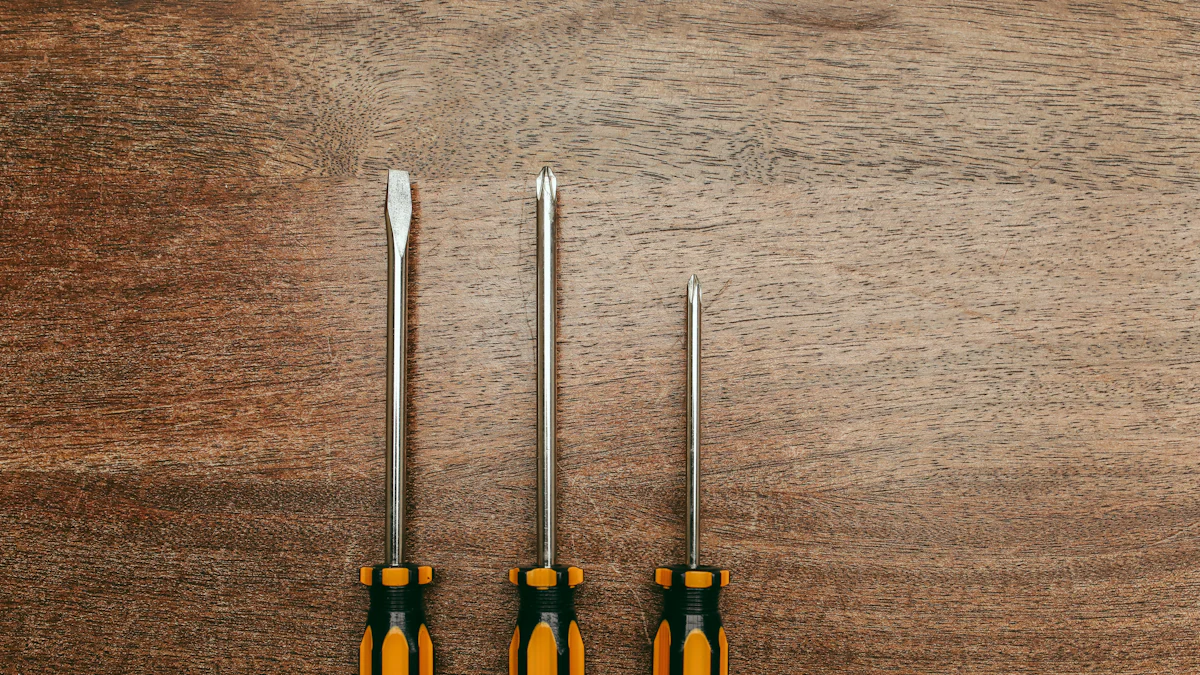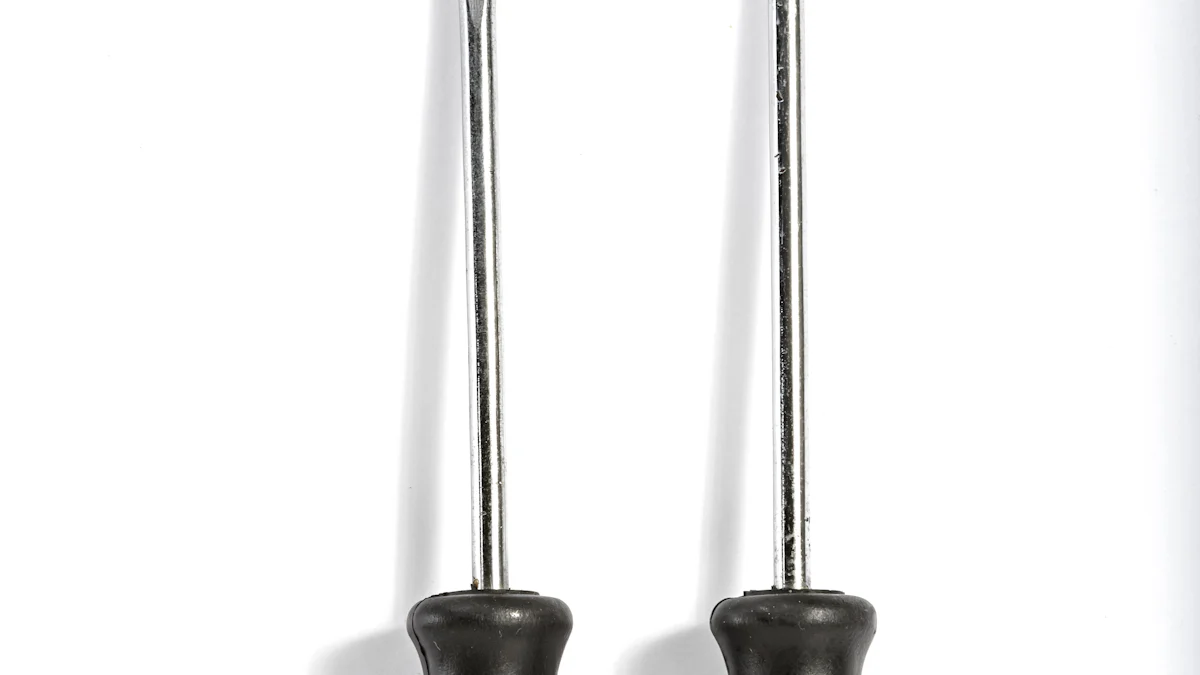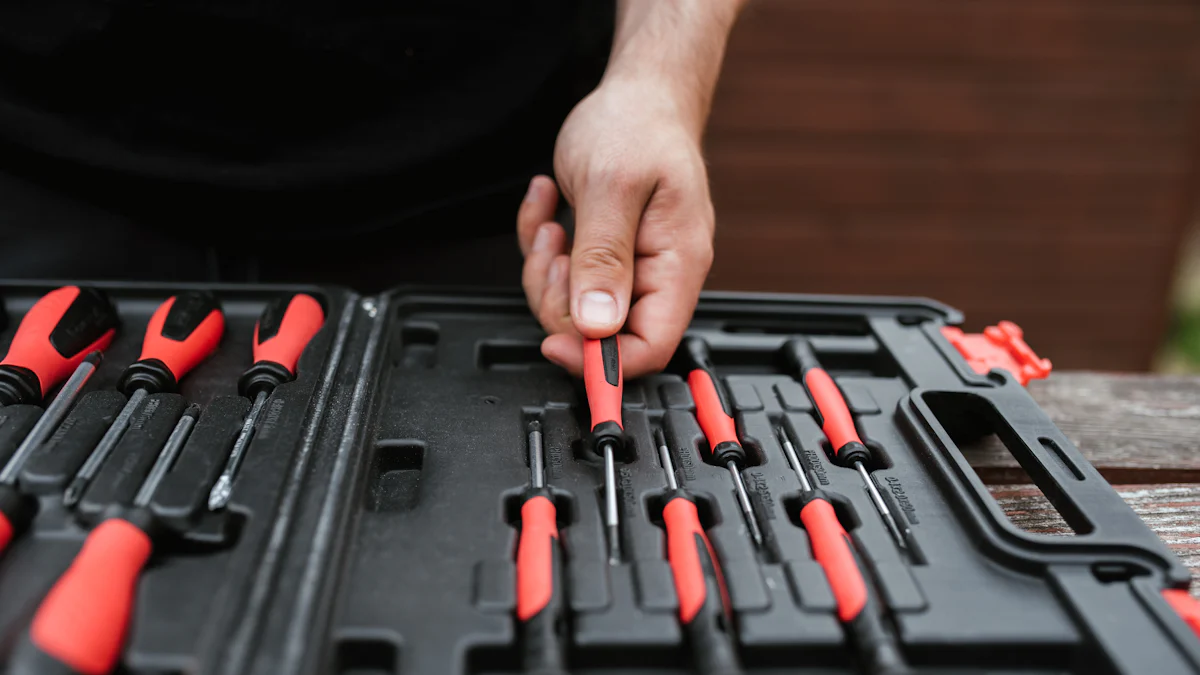
Choosing the right terminal screwdriver is crucial for ensuring secure and reliable connections. A terminal screwdriver, designed specifically for terminal blocks, offers precision and efficiency. This guide aims to help users make informed decisions by highlighting key factors and features to consider. Proper selection of a terminal screwdriver can enhance performance and safety, making it an essential tool for both professionals and DIY enthusiasts.
Understanding Terminal Screwdrivers

What is a Terminal Screwdriver?
Definition and Basic Function
A terminal screwdriver is a specialized tool designed for working with terminal blocks. Terminal blocks are used to connect electrical wires securely. The primary function of a terminal screwdriver is to tighten or loosen screws on these blocks. This ensures a secure connection, which is essential for safety and performance.
Common Uses and Applications
Terminal screwdrivers are commonly used in electrical work. Electricians use them to connect wires in circuit breakers and control panels. DIY enthusiasts also find terminal screwdrivers useful for home electrical projects. These tools are essential for anyone working with electrical systems.
Types of Terminal Screwdrivers
Flathead
Flathead terminal screwdrivers have a flat blade that fits into the single slot of a flathead screw. These are the most basic type of terminal screwdrivers. They are versatile and can be used in various applications. Klein Tools’ Terminal Block Screwdriver is an example of a high-quality flathead screwdriver.
Phillips
Phillips terminal screwdrivers have a cross-shaped tip. This design allows for better torque transfer compared to flathead screwdrivers. Phillips screwdrivers are commonly used in electrical and mechanical work. They provide a more secure fit in the screw head, reducing the risk of slippage.
Specialty Types (e.g., Torx, Hex)
Specialty terminal screwdrivers include Torx and Hex types. Torx screwdrivers have a star-shaped tip, which provides excellent torque transfer. These are becoming more popular as Torx screws appear in more devices. Hex screwdrivers have a hexagonal tip and are often used in mechanical applications. Both types offer advantages in specific situations.
Key Features to Consider
Handle Design and Material
The handle design and material of a terminal screwdriver significantly impact comfort and efficiency. Ergonomically designed handles, like those found in Connectwell’s professional tools, allow users to exert more torque with less effort. Handles made from durable materials ensure long-lasting performance.
Blade Material and Durability
The blade material of a terminal screwdriver affects its durability and performance. High-quality blades, such as those in Bell System screwdrivers, are precision-machined for an exact fit. Durable blades resist wear and tear, ensuring the tool remains effective over time.
Size and Precision
Choosing the correct size and precision of a terminal screwdriver is crucial. The blade must fit the screw head perfectly to avoid stripping the screw. For example, using a 1/8 inch flathead screwdriver for terminal block screws ensures a secure connection. Precision-machined tips, like those in Klein Tools’ screwdrivers, provide higher torque values and better performance.
How to Choose the Right Terminal Screwdriver

Assessing Your Needs
Type of Work (e.g., Electrical, Mechanical)
Identifying the type of work helps in selecting the appropriate terminal screwdriver. Electrical tasks often require precision and safety features. Mechanical jobs may need screwdrivers with higher torque capabilities. For example, a flathead terminal screwdriver suits electrical applications, while a Torx screwdriver provides better grip for mechanical tasks.
Frequency of Use
Consider how often the terminal screwdriver will be used. Frequent use demands a durable tool with ergonomic design. Occasional use might not require top-tier materials but should still ensure reliability. High-quality materials withstand frequent use, ensuring longevity and performance.
Evaluating Quality and Brand
Trusted Brands in the Market
Selecting a terminal screwdriver from a reputable brand ensures quality and reliability. Brands like Klein Tools, Wiha, and Wera are known for their high standards. These brands offer tools that meet industry requirements, providing peace of mind for professionals and DIY enthusiasts.
Quality Indicators (e.g., Material, Construction)
Quality indicators include the material and construction of the terminal screwdriver. Look for blades made from hardened steel for durability. Ergonomic handles reduce hand fatigue and improve efficiency. Precision-machined tips ensure a perfect fit, preventing screw stripping and enhancing performance.
Budget Considerations
Price Range and What to Expect
Terminal screwdrivers come in various price ranges. Higher-priced models often feature superior materials and construction. Mid-range options provide a balance between cost and quality. Budget models may lack some features but can still be effective for occasional use.
Balancing Cost and Quality
Balancing cost and quality is crucial when choosing a terminal screwdriver. Investing in a high-quality tool ensures long-term performance and safety. However, budget constraints may require compromises. Prioritize essential features like blade material and ergonomic design to get the best value for money.
Maintenance and Care
Proper maintenance and care of a terminal screwdriver ensure its longevity and effectiveness. This section provides essential techniques and tips for maintaining your tool.
Proper Use Techniques
Avoiding Misuse
A terminal screwdriver should only be used for turning screws. Using it as a drill, chisel, or pinch bar can damage the tool. Always match the blade width and thickness to the screw for optimal performance. This prevents stripping and ensures a secure fit.
Ensuring Safety
Safety is paramount when using a terminal screwdriver. Always wear appropriate safety gear, such as gloves and safety glasses. Ensure the work area is well-lit and free from obstructions. Avoid using damaged or worn screwdrivers, as they can slip and cause injury.
Cleaning and Storage
Cleaning Methods
Regular cleaning of a terminal screwdriver maintains its functionality. Wipe the blade with a clean cloth after each use to remove debris and moisture. For stubborn dirt, use a mild detergent and a soft brush. Dry the tool thoroughly to prevent rust.
Storage Tips to Prolong Lifespan
Proper storage extends the lifespan of a terminal screwdriver. Store the tool in a dry, cool place to avoid exposure to moisture and extreme temperatures. Use a tool organizer or a dedicated toolbox to keep the screwdriver in good condition. Avoid placing heavy objects on top of it to prevent bending or damage.
Troubleshooting Common Issues
Identifying Wear and Tear
Regular inspection helps identify wear and tear early. Look for signs of damage, such as chipped or bent blades, worn handles, or rust. A damaged terminal screwdriver can compromise safety and performance. Address issues promptly to maintain the tool’s effectiveness.
When to Replace Your Terminal Screwdriver
Knowing when to replace a terminal screwdriver is crucial. Replace the tool if the blade no longer fits screws securely or if the handle shows significant wear. A compromised screwdriver can lead to stripped screws and unsafe connections. Investing in a new, high-quality terminal screwdriver ensures continued reliability and safety.
Choosing the right terminal screwdriver ensures optimal performance and safety. Key points include understanding the types and features of terminal screwdrivers, assessing specific needs, and evaluating quality and brand reputation. For the best results, prioritize ergonomic handle design, durable blade material, and precise sizing. Investing in high-quality tools like those from Klein Tools or Bell System guarantees long-term reliability. Proper maintenance and care will extend the lifespan of your terminal screwdriver, making it a valuable addition to any toolkit.
